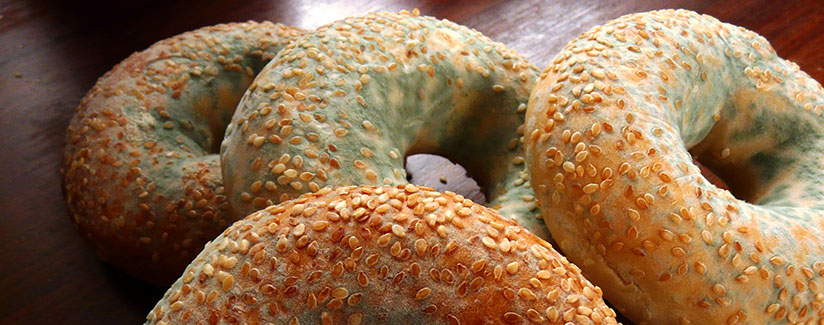What Happens When You Eat Expired Food?
The expiration date is not a hard limit. The expiration date is a legal requirement to warranty that the food gets fresh to the final customer. Expiration dates often have a security margin to minimize the chances of food going bad before the expiration date.
“I’m starting to think I buy bananas just to watch them die a slow death in my own home.” –Anonymous.
You open the fridge, drag out the cottage cheese, check for fur, and if there isn't any, you say, "Honey? Will you sniff this?" This is not, however, the approved method of checking for freshness. The approved way lies in a voluntary system of labeling.
Yes, voluntary. The only items required by federal law to be labeled for expiration are infant formula and some baby foods; some states also mandate pulling dairy from store shelves on the expiration date.
The expiration date is a legal requirement to warranty that the food gets fresh to the final customer.
Expiration dates often have a security margin to minimize the chances of food going bad before the expiration date.
So, the expiration date is not a hard limit. Fresh products like milk have shorter expiration dates, but even if you open a bottle of fresh milk after its expiration date, and it smells good, then it's good. If it smells foul it means fermentation has started. Even if you drink it, it probably won't hurt you, as normal fermentation is used to make cheese and yogurt from milk.
Expired white bread might not be as soft as a fresh one, but still edible. If many days have passed, it may grow mold. In this case, it may taste bad, but mostly harmless, unless you are allergic to penicillin.
In some places expired white bread, retired from stores is reprocessed into toast white bread, which when expired is grind into bread powder, which when expired is turned into crumble cookies.
Sometimes expired human food is used to feed animals.
Food with expiration dates of years probably will be edible months or a year after the expiration date.
The main risk of eating long expired food, especially canned food, is the risk of developing botulism bacteria.
It can be the result of sterilization of food not being perfect, or container failure, allowing pathogens to enter and contaminate the food.
So, eating food a few days after the expiration date, won't hurt you, but I won't eat food years after expiration date. Unless there is a zombie apocalypse.
Remember, expiration dates are for unopened food containers. Once you open the container, expiration date means nothing. Food will normally last some days or hours, depending on temperature and exposure to bacteria.
Salmonella Risk
Salmonella is the most common kind of food poisoning, according to the FDA, and eggs can be one source of that bacteria. Both the eggshell and the interior of the egg, including the white and yolk, can be contaminated with salmonella, and improperly cooking or storing the eggs increases your risk of getting sick. Richard Emerson, author of "Read the Label!: Discover What's Really in Your Food," notes that salmonella can build up over time, which means that the older your eggs are, the more salmonella bacteria they might contain. This is particularly true if your eggs are stored at a temperature above 40 degrees Fahrenheit. Because you can't see the bacteria that causes salmonella, it's imperative that you throw out expired eggs.
Other Health Risks
All eggs eventually spoil, but the organisms that cause the spoilage won't cause food-borne illness, according to the Incredible Edible Egg website. As eggs age, however, they can grow different kinds of bacteria, called pseudomonas. This bacteria causes eggs to turn a bluish-green color and to develop a sour, fruity odor, according to the Incredible Edible Egg website. Mold can grow on eggs as well if they're stored in humid areas or are washed in dirty water. Though pseudomonas and mold don't cause food-borne illnesses, they can make you sick to your stomach, so if you notice a change in color, odor or appearance of your eggs, play it safe and don't eat them.
How Long Are Foods OK to Eat?
If you are not up on your Julian calendar and dating seems sort of a hodgepodge, how about memorizing some basic rules?
· Milk. Usually fine until a week after the "Sell By" date.
· Eggs. OK for 3-5 weeks after you bring them home (assuming you bought them before the "sell by" date). VanLandingham says double-grade As will go down a grade in a week but still be perfectly edible.
· Poultry and seafood. Cook or freeze this within a day or two.
· Beef and pork. Cook or freeze within three to five days.
· Canned goods. Highly acidic foods like tomato sauce can keep 18 months or more. Low-acid foods like canned green beans are probably risk-free for up to five years.
Here are 5 Foods You Can Still Eat After the Expiry Date
1 Canned Goods. Make sure to keep your canned goods in a cool, dry spot though, and if there are any dents, rust or leaking, that's when it's time to ditch the goods.
2 Hard cheeses such as cheddar and Parmesan are still alright to eat even after the mold has started to form. Just make sure to cut off any moldy parts before consuming. Generally, hard cheeses are okay to eat for a month past the expiration date.
3 Cereal. Not everyone likes the same cereal in a household. If members of your family enjoy different brands, those cereal boxes can stock up and take longer to consume. Rest assured, cereal is okay to eat for up to six months past the best before date — so long as you can handle the stale flavor!
4 Cookies, Crackers, and Chips. When cookies or chips get old, the stale taste is quite obvious. But as long as it doesn't smell bad (the oils in the cookie may go off over a long period of time), and it doesn't crumble apart in your hand, then it's okay to eat more of those snacks.
5 Dry Pasta. Pasta won't spoil easily because it's a dry product. You can use it well past the expiration date, so long as it doesn't smell funny (egg pasta can produce a rancid odor). Generally, dry pasta has a shelf life of two years, but you can typically push it to three.
Final tip:
When in doubt, use your senses. If something smells bad or looks off-color, throw it away!
Search
Categories
Popular Posts



















Comments: 0
No comments